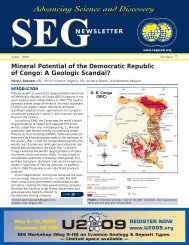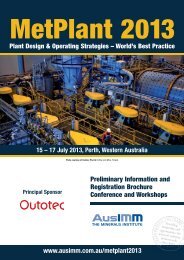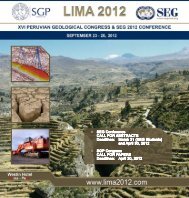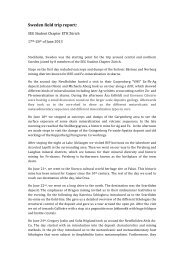SEG 45 Final_qx4 - Society of Economic Geologists
SEG 45 Final_qx4 - Society of Economic Geologists
SEG 45 Final_qx4 - Society of Economic Geologists
You also want an ePaper? Increase the reach of your titles
YUMPU automatically turns print PDFs into web optimized ePapers that Google loves.
26 <strong>SEG</strong> NEWSLETTER No 55 • OCTOBER 2003<br />
... from 25<br />
Industry Commentary (Continued)<br />
COMMENTARY<br />
they go ahead it is because they expect<br />
the risk will pay <strong>of</strong>f and they’ll not only<br />
get their money back but make a substantial<br />
pr<strong>of</strong>it, as well.<br />
If capital is raised through the market,<br />
the same applies to the brokers.<br />
They charge a fee for the service and<br />
expect an arrangement in which they<br />
also act as the share broker (for a price)<br />
and have access to a parcel <strong>of</strong> discounted<br />
shares they can sell to clients<br />
(for a fee and pr<strong>of</strong>it).<br />
Of course, anyone involved in<br />
financing a project is bound to check<br />
that the project is, in fact, viable. But<br />
viability in this context means that they<br />
will get their money back and make a<br />
pr<strong>of</strong>it. It has nothing to do with being<br />
viable in the longer term for shareholders.<br />
So anyone providing finance has a<br />
vested interest in encouraging projects<br />
that look as though they will survive at<br />
least for as long as it takes to recoup the<br />
investment and make a pr<strong>of</strong>it. Longerterm<br />
viability is not a concern.<br />
For the lenders it is relatively simple:<br />
if the project collapses before they have<br />
extricated themselves, then the company’s<br />
assets will be sold to get their<br />
cash back. If it is successful (for them),<br />
they have first access to any returns<br />
generated by the project, and collect<br />
their capital and pr<strong>of</strong>it. Once they have<br />
collected their return they have no further<br />
obligations. They encouraged the<br />
project, approved it, financed it, made it<br />
possible, and in most cases they walk<br />
away with full pockets and clean<br />
hands.<br />
It is a bit more difficult for the<br />
brokers if financing has<br />
been done through<br />
The<br />
attraction <strong>of</strong> the minerals<br />
industry for investors has always<br />
been the hope <strong>of</strong> big returns. Only a<br />
equity. Certainly,<br />
they make their<br />
pr<strong>of</strong>it, but it can<br />
return to bother<br />
them. If they encouraged<br />
someone to buy<br />
your shares, and it turns out to<br />
be a bad investment, then they have an<br />
unhappy client. The agent has still<br />
made his pr<strong>of</strong>it, but he gets some blame<br />
from his client, and naturally he tells<br />
his client that it is not his fault. Again,<br />
the brokers approved the project,<br />
encouraged it, made it possible, and in<br />
most cases made a lot <strong>of</strong> money from it.<br />
But they place blame for any failures<br />
with the industry.<br />
I do not suggest that the industry is<br />
blameless in this. What I do say is that<br />
the people who point the finger at us,<br />
saying it is OUR fault, are themselves<br />
equally or more to blame. When the<br />
analysts point their fingers at us, there<br />
few minerals companies can<br />
provide that.<br />
is nothing we can do that will change<br />
the situation. Why not?<br />
In issuing a prospectus for a new<br />
shoe factory, the financial assessment is<br />
fairly straightforward. There is not a lot<br />
<strong>of</strong> blue sky for a broker to promote<br />
stock. But a mining venture is a<br />
different story. There is a lot <strong>of</strong><br />
guesswork in the figures, so a<br />
lot can be done to dress figures<br />
up to look great. Whatever the<br />
industry itself does, it is surrounded<br />
by and has to deal with<br />
people who make a lot <strong>of</strong> money out<br />
<strong>of</strong> promoting investments and developments,<br />
even ones that are not viable in<br />
the long term. That is the environment<br />
we operate in. How are we in the industry<br />
supposed to change that?<br />
Another issue is that the way companies<br />
are managed has changed, mainly<br />
in response to pressure from investment<br />
funds. Investment funds have vast<br />
amounts <strong>of</strong> money, and they want to<br />
get the best return they can. Fund managers<br />
are assessed on a three-month<br />
basis, so they are only interested in<br />
short-term results. Fund managers wield<br />
great power and can be very interventionist.<br />
Companies that need to borrow<br />
capital have changed their management<br />
approach in response to the<br />
demands and expectations <strong>of</strong> fund<br />
managers. Company managers are<br />
now appointed to produce high returns<br />
in the short term. Their performance<br />
targets are set high, with big bonuses<br />
for achievement. Naturally, they<br />
respond by making decisions based on<br />
short-term outcomes, which is a big<br />
problem in an industry characterized<br />
by long lead<br />
times. There are many<br />
examples where these<br />
short-term performance<br />
goals have led to<br />
the high grading <strong>of</strong><br />
deposits and deferment <strong>of</strong><br />
mine development work to the detriment<br />
<strong>of</strong> the long-term viability <strong>of</strong> the<br />
orebodies. Also to be considered is that<br />
a decision to develop a new mine may<br />
be look good during a period <strong>of</strong> high<br />
metal prices, but will it still look good,<br />
long-term, in periods <strong>of</strong> average or low<br />
prices?<br />
The attraction <strong>of</strong> the minerals industry<br />
for investors has always been the<br />
hope <strong>of</strong> big returns. Only a few minerals<br />
companies can provide that.<br />
Analysts say the average return across<br />
the industry is poor, but quoting average<br />
returns is meaningless for an industry<br />
where part is based on production,<br />
and part is speculative.<br />
In<br />
issuing a prospectus<br />
for a new shoe factory . . .<br />
there is not a lot <strong>of</strong> blue sky for<br />
a broker to promote stock.<br />
Whatever we in the industry do,<br />
share brokers and investment analysts<br />
will continue to promote speculative<br />
shares, and financiers will continue to<br />
encourage developments<br />
based on<br />
short-term<br />
attractiveness,<br />
not long-term<br />
viability.<br />
Blaming geologists<br />
for the<br />
But a mining venture is a<br />
different story. situation the<br />
industry faces is preposterous.<br />
<strong>Geologists</strong> are<br />
typically at the bottom <strong>of</strong> the datagathering<br />
chain leading to project viability<br />
decisions. The problem is not that<br />
the geologists have failed to provide the<br />
essential information required for correct<br />
decisions; rather, people higher in<br />
organizational hierarchies are <strong>of</strong>ten<br />
driven by motives that are unrelated to<br />
technical information. Moves to educate<br />
geologists in mineral economics<br />
would be relevant if geologists made the<br />
economic decisions, but they do not.<br />
It is also commonly claimed that<br />
exploration is too expensive and we<br />
must become more efficient. The fact is<br />
that we have been too successful, and<br />
too much has been found and brought<br />
into production, and so real prices have<br />
declined. Does that make explorers inefficient,<br />
or are we the victims <strong>of</strong> our own<br />
success? There is also a long list <strong>of</strong><br />
deposits that have been found by<br />
explorers but have not yet been developed<br />
because they are not economic. In<br />
periods <strong>of</strong> high prices many <strong>of</strong> them<br />
will be financed, promoted, and developed,<br />
and will suffer the fate <strong>of</strong> many<br />
others when prices inevitably fall again,<br />
thus continuing to make the situation<br />
worse.<br />
With company pr<strong>of</strong>it margins being<br />
squeezed, it is essential to maximize<br />
efficiency, but to accuse explorers <strong>of</strong><br />
inadequacy because <strong>of</strong> a situation that<br />
has arisen solely because <strong>of</strong> their being<br />
too successful is unreasonable. We are<br />
caught in a vicious circle where our success<br />
puts us under increased pressure to<br />
be even more successful with less. We<br />
must accept that pressure, but we<br />
should reject false accusations that the<br />
situation is somehow solely the fault <strong>of</strong><br />
the industry or <strong>of</strong> geologists. Our industry<br />
is accused <strong>of</strong> destroying billions <strong>of</strong><br />
dollars in shareholder funds. In fact,<br />
they were destroyed by irresponsible<br />
and overly enthusiastic financiers, fund<br />
managers, and share brokers—the minerals<br />
industry was simply the vehicle<br />
they used to do it.1
















